Watch the segment here.
Racism

Forget about being a "post-racial" society. But we must learn to embrace the country's ever-greater diversity

Reverend Jim Wallis joins us to discuss his new book "America's Original Sin: Racism, White Privilege, and the Bridge to a New America".
WATCH: Black Lives Matter Activist DeRay Mckesson Helps Stephen Colbert Confront His White Privilege
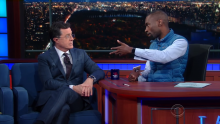
“Baby steps.”
That’s the amount of progress leading Black Lives Matter activist DeRay Mckesson agreed Stephen Colbert made toward overturning his white privilege when the two sat down on Martin Luther King Day to discuss racism.
The interview got personal when Colbert switched seats with DeRay, letting the activist ask the questions. Colbert’s responses are clearly well-meaning, but also genuinely awkward. White privilege is tough for white people, even (perhaps especially) for renowned television hosts.
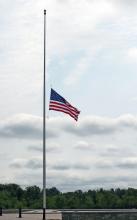
On Dec. 28, just before New Year’s Day, a Cleveland grand jury declined to indict the officers who killed Tamir Rice, a 12-year-old boy who had been playing with a toy gun in a park near his home. For many, the news resounded as yet one more tragic refrain in the long litany of our nation’s utter disregard for Black lives. Extinguished in the innocence of childhood, without even a second thought.

Trump held his audience spellbound for the first part of his message, which included a reference to Jesus turning over the voter registration tables in the temple, but then he invoked a scripture from the second book of Corinthians. “Two Corinthians 3:17, that’s the whole ballgame.”

As a black, same-gender loving woman, who is a pastor, Bishop and activist, I can solidly say that my wife, children, grandchildren, and community have stronger allies, greater opportunities, and more protections than we have ever had. This is in many ways attributable to a growing number of black clergy who are no longer willing to stand idly by and watch large segments of the communities they were called to serve alienated, stripped of rights, physically abused, and treated unjustly. They have taken the costly stand against the notion that LGBTQ people are unworthy of God’s love and full acceptance within the church.

The best way to change that old talk that black parents have with their children is to start a new talk between white and black parents. These conversations will make people uncomfortable, and they should. White parents should ask their black friends who are parents whether they have had “the talk” with their children. What did they say? What did their children say? How did it feel for them to have that conversation with their children? What’s it like not to be able to trust law enforcement in your own community?
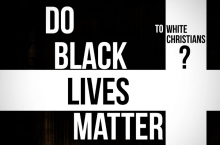
Most polls don’t matter much. But this one does. A recent Public Religion Research Institute survey has revealed a devastating truth: While about 80 percent of black Christians believe police-involved killings — like the ones that killed Tamir Rice, Laquan McDonald, and so many more — are part of a larger pattern of police treatment of African Americans, around 70 percent of white Christians believe the opposite … that they are simply isolated incidents.

[Editor's note: The following is an excerpt from Jim Wallis' new book America's Original Sin: Racism, White Privilege, and the Bridge to a New America. Order your copy here.]
IN JOHN 8:32, JESUS SAYS, “You will know the truth, and the truth will make you free,” which is one of those moral statements that breaks through the confusion and chaos of our lives—untruths that we believe are able to control us, dominate us, and set us on the wrong path. Untruths are burdens to bear and even can be idols that hold us captive—not allowing us to be free people who understand ourselves and the world truthfully.
The families of the victims of the Charleston church shooting last June have spoken grace and truth, and their example could inspire us to acknowledge and change the truths about race in America. Their grace will test the integrity of our truth and our response. Will we seek, tell, and respond to the truth as we go deeper in our needed new national conversation and action on racism in America?
For example, we have seen and heard painful revelations about how police—and, even more systematically, the criminal justice system—too often mistreat young men and women of color. What happened in these incidents? And are they just “incidents,” or is there a pattern here? Is there really just one criminal justice system for all of us—equally—or are there actually different systems for white Americans and for Americans of color?
Are we hiding behind untruths that help make us feel more comfortable, or are we willing to seek the truth, even if that is uncomfortable? The gospel text cited above is telling us that only by seeking the truth are we made free, and that hanging on to untruths can keep us captive to comfortable illusions.
And if the untruths are, more deeply, idols, they also separate us from God—which is, obviously, highly important for those of us who are people of faith.
America’s foundation
The title of my new book, America’s Original Sin, is itself unsettling and, for many, provocative. We first used the phrase in a 1987 cover story in Sojourners magazine. The language of “America’s original sin” helped me understand that the historical racism against America’s Indigenous people and enslaved Africans was indeed a sin, and one upon which this country was founded. This helps to explain a lot, because if we are able to recognize that the sin still lingers, we can better understand issues before us today and deal with them more deeply, honestly, and even spiritually—which is essential if we are to make progress toward real solutions.
New York City police commissioner William Bratton acknowledged at a church breakfast in 2014 the negative role of police against African Americans throughout American history. “Many of the worst parts of black history would have been impossible without police,” Bratton said. You can imagine my surprise when he then used the language of original sin: “Slavery, our country’s original sin, sat on a foundation codified by laws enforced by police, by slave-catchers.” Bratton is no theologian or liberal academic but rather an experienced, knowledgeable, and tough cop. In fact, Bratton has been a controversial figure in New York, coming under fire for his “broken windows” policing strategy that focuses on aggressively targeting low-level offenses in order to deter more serious crime—a strategy that many say disproportionally affects people of color.
Bratton reminded fellow New Yorkers that the colonial founder of New York City, the Dutchman Peter Stuyvesant, was a supporter of the slavery system and created a police force to enforce and protect it. “Since then,” said the commissioner, “the stories of police and black citizens have been intertwined again and again.” He called the role of the NYPD sometimes “corrosive” in race relations. Bratton was talking about how the “original sin” has lingered in our criminal justice system, which is a reality that many people of color experience.
‘What do they want?’
I agree with Commissioner Bratton that telling the truth about America’s original sin is the best way to deal with it and ultimately be free of it. That makes moral and practical sense. Yet the truth of systemic injustice in the past and present must also compel us to action. It remains to be seen whether Bratton’s acknowledgment of the historical issues translates into a commitment to real and ongoing reforms in how his police do their jobs.

Black people’s humanity is still at question in the stories so many of us hear and tell in America. For many with a badge, a gun, and the legal shield of the state, black men and women — even black children — are not humans. Instead black bodies are threats and targets for rage, fear, and racially justified execution. When an officer of the law exterminates on the spot, we must ask ourselves what he was shooting. In his mind, Tamir could not have been a boy. He could not have been human. What did he see? And who bewitched him (and us) to “see things” when we are entirely sober?
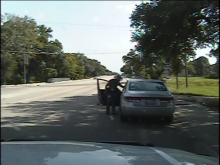
Bland was found dead in a jail cell after being arrested during a traffic stop, when she was pulled over for changing lanes without signaling. Police claim that her death was a suicide, but friends and family don’t believe it.

Bryan Stevenson, the nation’s premier lawyer on mass incarceration and the death penalty, says slavery never ended. It just evolved.
I just spent two days with 50 other faith leaders at Stevenson’s Equal Justice Initiative in Montgomery, Ala., where Bryan emphasized four basic essentials for criminal justice reform in America: 1) Proximity to those most impacted, 2) Changing the narrative, 3) Hope replacing hopelessness, and 4) Committing ourselves to uncomfortable things, because injustice is never overcome by just doing comfortable things.
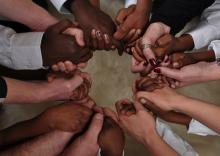
The massacre of nine African-American worshippers during a Bible study at a church in Charleston, S.C., earlier this year has led black and white churches to come together in an effort to improve race relations.
On Dec. 15, the Conference of National Black Churches, a decades-old black church organization, hosts the latest such interracial religious gathering in the city where the shooting occurred in June.
More than 300 clergy and community leaders are expected to attend the three-day (Dec. 15-17) conference. It will include a worship service at Emanuel African Methodist Episcopal Church, the place where the Bible study was being held. Dylann Roof, the white suspect in the killings, who had hoped to “start a race war,” has been charged with federal hate crimes.
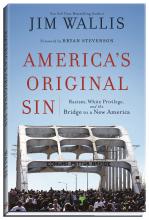
Jim Wallis is determined to bring ongoing conversations about race in America to his fellow white Christians.
“If white Christians acted more Christian than white,” he writes in his latest book America’s Original Sin: Racism, White Privilege, and the Bridge to a New America, “black parents would have less to fear for their children.”
Below, you can watch the trailer for the book, which focuses on the Edmund Pettus Bridge in Selma, Ala., where hundreds of civil rights demonstrators were attacked by armed policeman in 1965.

Speakers at the rally included representatives of the Islamic and Christian communities, the National Organization for Women, Code Pink, and Ghada Mukhdad, a Syrian refugee and member of the Syrian Civil Coalition which, according to their website, is a “lobby of Syrian civil society organizations, activists, and initiatives” that seeks to address “the increasing gap between the needs and priorities of the Syrian society on one hand and those making decisions concerning Syria.”